
Rich countries seek to shirk responsibility as Bonn climate talks open
With only six weeks to go before world leaders meet at key United Nations talks in Paris, negotiators are gathered in Bonn this week in an effort to move closer to a global deal to curb climate emissions.
The UN intersessional in Bonn opened today with developing countries squaring up to fight for a fair deal against the rich industrialised countries who are attempting to shirk their responsibility for responding to the climate crisis. Questions are being raised about the process by which the current negotiating text was produced, with civil society observers condemning it as drafted by the USA and its allies to the exclusion of countries most vulnerable to, but least responsible for, climate change.
Friends of the Earth Scotland Head of Campaigns Mary Church, who is attending the talks, said:
“What we are seeing as the Bonn talks open is rich countries setting the stage for a great climate getaway in which they shift the burden of responsibility for tackling the climate crisis onto the shoulders of the poor. If the deal that world leaders sign in Paris looks anything like the Bonn negotiating text, then world leaders will have wholly failed to respond to the urgency of climate science, let alone climate justice.”
Figures announced today from a civil society review of countries pledges to cut climate emissions shows that big polluters including the EU, USA and Russia have woefully failed to acknowledge their historical responsibility for the climate crisis and contribute their fair share of emissions cuts. However, China, Kenya, India, and the Marshall Islands are amongst developing countries that have committed to undertaking action that represents or even exceeds their fair share. [2]
Church continued:
“Wealthy countries understand the need to tackle the climate crisis, but are stubbornly unwilling to respond to it in a fair and equitable way. The figures published today show that far from blocking progress, China and India have committed to over and above their fair share of emissions cuts, while pledged action from major polluters like the EU and the USA is woefully inadequate.
“As they stand, combined pledges put us on track for 3oC warming which means devastating impacts for billions of the world’s poorest people. Not only are developed countries delaying urgent action to curb climate emissions at home, they are also failing to provide necessary support and finance to developing countries to adapt to the impacts of climate crisis that are already being felt.
The talks will continue until Friday and are the last opportunity for countries to negotiate ahead of the UN talks in Paris in December.
Church continued:
“As the international climate process appears intent on leaving climate action until long after it is safe to do so it is increasingly important that countries act at home now. The Scottish Government must take radical steps to get back on track with its commitments under our world-leading climate legislation. We call on all the parties to set out clearly how they will meet our legal obligations under the climate act before the 2016 elections.”
ENDS
Notes for editors
1. The UNFCCC intersessional negotiations are taking place in Bonn from 19 to 23 October. The current negotiating text was published on 5 October. The text is available at: http://unfccc.int/resource/docs/2015/adp2/eng/8infnot.pdf. Friends of the Earth Scotland's Mary Church is attending the talks.
2. Fair Shares: A Civil Society Equity Review of INDCs Summary is available at: http://civilsocietyreview.org/. Friends of the Earth International are among the organisations from a broad cross section of civil society who commissioned the review.
The full report will be available in November.
Report findings:
· The ambition of all major developed countries falls well short of their fair shares, which include not only domestic action but also international finance. Those with the starkest gap include Russia (contributing nothing towards its fair share), Japan (contributing about a tenth of its fair share), the United States, contributing about a fifth of its fair share) and the EU, contributing just over a fifth of its fair share).
·The majority of developing countries assessed have made mitigation pledges that exceed their fair share. This includes Kenya, the Marshall Islands, China and Indonesia. India’s INDC is broadly in line with its fair share while Brazil’s is slightly more than two thirds of its fair share.
· Most developed countries have fair shares that are already too large to meet by cutting its emissions alone. The remainder of their fair shares must be met by providing support for an equivalent reduction of emissions in developing countries. This accounts for almost half of the cuts needed globally, indicating the need for a vast expansion of international finance, technology and support.
· Although climate finance is critical for developed countries to deliver their fair shares, there is a striking lack of commitments. Scaled-up international finance is required so developing countries can go beyond their own fair shares and deliver the total emissions cuts needed globally. A significant increase in public climate finance is also needed to meet adaptation needs and to cover loss and damage in developing countries, particularly for the most vulnerable.
3. Friends of the Earth Scotland will be represented in Paris throughout the two weeks of the climate conference in December and will be helping 100 activists from Scotland attend the civil society events at the end of the conference. Find out more and register your interest now here
4. Friends of the Earth Scotland is
* Scotland's leading environmental campaigning organisation
* An independent Scottish charity with a network of thousands of supporters and active local groups across Scotland
* Part of the largest grassroots environmental network in the world, uniting over 2 million supporters, 75 national member groups, and some 5,000 local activist groups. www.foe-scotland.org.uk
